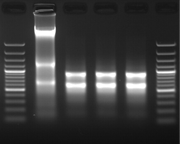- Pagina principal
- Búsqueda texto
- Biochemistry+Learning+Activities
Tipo de resultado
Refinar resultados

VWR® for nucleic acid preparation
Featuring solutions covering the entire workflow: Sample disruption & homogenisation, nucleic acid isolation, photometry, centrifugation & storage.
Need pure DNA or RNA?
get it quick & easy.
Esta buscando: Biochemistry+Learning+Activities
67 950 results were found
SearchResultCount:"67950"
Sort Results
Vista lista
Vista Extendida (Nueva)
Vista lista
Vista Extendida (Nueva)